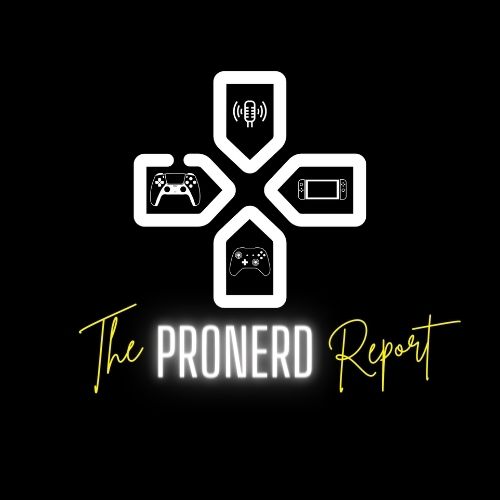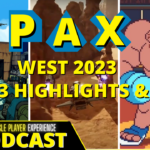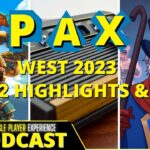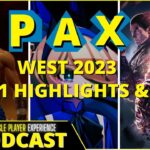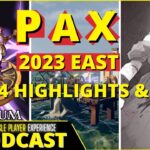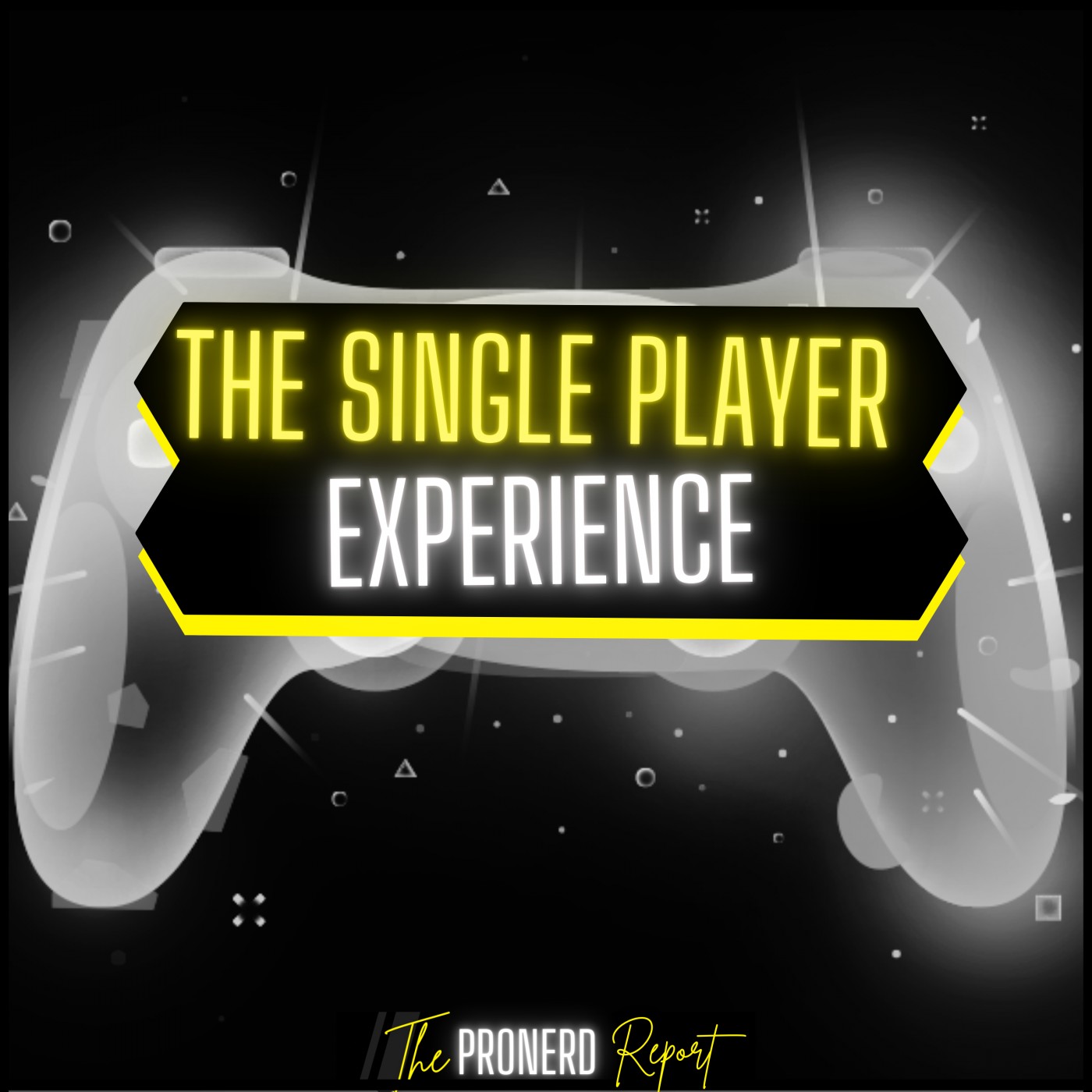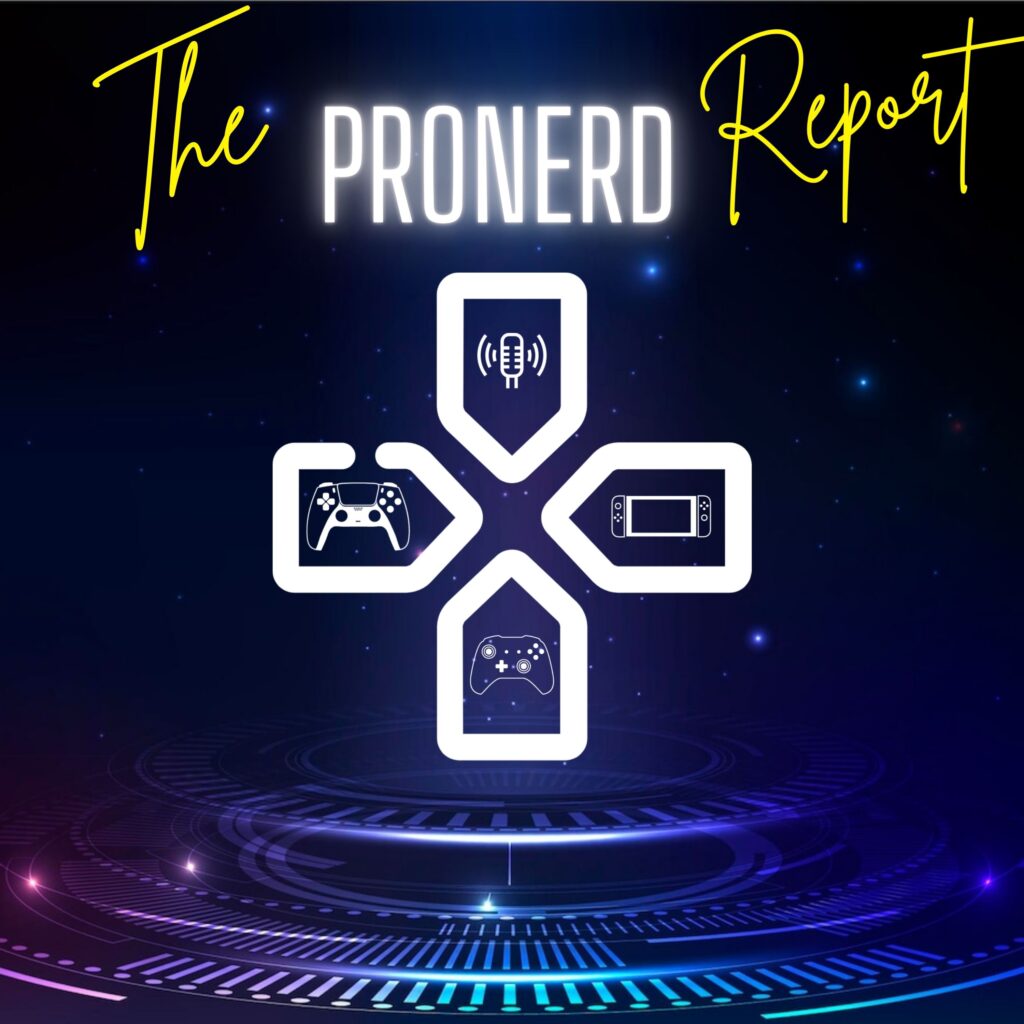The future of the gaming industry with NFTs – Featuring NFT and WEB3 Specialist, Sam Kamani!
On this Episode of The Single Player Experience, Our host Sebastion Mauldin, talks with the host of the Web3 Podcast, Sam Kamani. Sam tells us all about Web3 gaming, we talk about whether or not NFTs are wrong, and Sam gives his prediction on the gaming industry’s future with NFTs.
We also talk about how game developers will use the play to earn formula and NFTs.
We’ve got All this and more on this episode of the Single Player Experience Podcast!
Sebastion and The Single Player Experience Links:
Head to Discord to join the FREE Single Player Experience Discord Server! https://discord.gg/YeCwD6gtDv
For more episodes, head to Apple Podcasts.
Write In Here: https://pronerdreport.com/contact/
Facebook Group: https://www.facebook.com/profile.php?id=100089582529402&sk=about
Sam Kamani’s Socials links:
Transcript
what's up? What's up? What's up? And welcome to the Single Player Experience. As always, I'm your host, Sebastian Malden, and in this episode we're doing a deep dive into the world of NFTs and video games, and for a topic that I have very little information about, like I'm not an N F T expert to say the least. So I had to call in the big guns to help me out with this. So my guest today is a professional web three strategist. He's the host of the Web three podcast, and he's been a speaker at TEDx and the N F T Micro Summit. My guest today is the web three expert, Sam Kamani. In this episode, Sam is gonna give us a glimpse into the future with NFTs and video games. He's also gonna give us his predictions about the future of the video game industry as a whole. We got all this and more coming right at ya on the Single Player Experience podcast. Dj. Start the intro, man. Ladies and gentlemen, like I said in the intro, I have a very special guest with me today. He is an expert in NFTs Web three gaming and an all around great guy. This is Sam Kamani. How you doing, Sam?
Sam:Very good, thanks. How about yous?
Sebastion:I'm doing well. I'm doing well. I'm so glad to have you on the show. Like I kind of said right before we began, I've been really excited to get you on the show. I think you can offer the audience a really cool perspective on a lot of different topics, and I'm glad to
Sam:have you. No, it's great to be here. And even our brief conversation before this, I really enjoyed it, so I can tell that it's gonna be fun. So yeah, let's get into it.
Sebastion:Yeah. Yeah, so I'm, I'm really glad to be able to steal a moment of your day. I'm in Dallas, you're way in New Zealand, so I know there's a big time difference there, so I gotta just, I gotta ask you, so right off the bat, We have a segment that, that we do for new guests, we call it, or putting you on the spot segment. So Sam, what are your favorite video games of all time? Your top five games?
Sam:Okay. Top five games. Mm-hmm. Um, there'll be a lot of bungee games, Okay. That's fine. That's fine. There, there's a Halo series. I mean, of course they don't own it now, but they used to. That's when they started. Mm-hmm. Um, um, destiny, um, gears of our mass effect. And then let me see, what else have I played a lot? Um, yeah, I mean, they're all, most, more or less like first person, um, shooter, first person shooter. Mm-hmm. Yeah. Yeah. Um, and I have played, uh, what I got and, and Doom Okay. And doom would be the, yeah.
Sebastion:That's a really cool list. All first person shooters. But I feel like that would be like the Mount Rushmore first person shooters. You got like the icons up there. That's really, really cool. I know,
Sam:I know. I mean, the battlefield and Call of Duty should be there, the two massive franchise. But then for me, they got the same, all, same old, they felt the same. They felt like not much change in, in those two games. Mm-hmm. Um, and I did try playing a lot of, um, What do you call it? Like battle? Battle Royal, like apex, televisions, pubg, Fortnite, all that. Um, but um, but it's okay. I I like the story as a bit like you story aspect of it. Mm-hmm. and I do play multiplayer as well. I played a lot of destiny and Hello multi. I did the, I'm the old, old school multiplayer. We used to take the Xboxes to friend's house and connect the la like TVs, like a builder chain of TVs and Xboxs and. Play screen and, and then, um, take turns and stuff. And we used to do that. And so I, I've played that sort of multiplayer and had so much fun, so many memories from back in the days. So yeah. I love those
Sebastion:days. The, the local mocha multiplayer, it was fun. It really was Yeah.
Sam:Yeah. So I've done that.
Sebastion:Yes. Our backpacks were a lot heavier back then too. Having to carry those big Xboxs around.
Sam:Exactly right. Yeah. Xbox button and stuff carried around. Yeah. So.
Sebastion:So how long have you been in, in the field of like web three gaming and NFTs and you know, econ, like all the finance stuff. How long have you been involved in all this? Let me, let
Sam:me give you a bit of my background from sort of start in the last sort of like last 15 years. Mm-hmm. I've been actually involved with lots of different tech startups. So my first startup was in the e-commerce space. So we built, um, Our own brand. We sold it all around the world. And I mean, that's why I've been coming to us since 2007. Um, in 2015 I sold that company and then I joined eSports. So I was sort of like, um, all in on the, in the eSports world, we used to create software. To run eSports to domains. So say like, league of Legends or Dota or um, PUBG or we people would use our software, create a tournament, create brackets, disconnect their steam or Xbox or PlayStation login and, and off they go. And then they could. Um, stream those and all that. So we did all that and that company got acquired in, I was their sort of c o o that company got acquired in 2018. Okay. But during this time, I'd been keeping an eye, um, over the years on what's happening in blockchain world. You know, what's happening in crypto, what's happening? Um, so I used to play crypto kitties, um, um, back in 20 17, 18 for someone. So that is like the kind of like the genesis. Uh, blockchain gaming or Web three gaming, or N f t gaming, whatever you wanna call it. And you get these sort of silly little cats and you breed them and then you sell them. And, um, and yes, I mean, we, we did that for fun. Um, and then until the whole. Um, crypto market faced the downturn and then everyone disappeared, and then no one was doing it. And then I lost the the keys to log in, and then I changed my laptop, changed my phones multiple times after that, and then I could no longer remember. So it's, it's okay. So I didn't really care. Right. Just few random cats. um, um, but, but had fun, um, doing that and, and it's not as involved as playing. Mm-hmm. um, Like a game with a huge story campaign with your friends? Mm-hmm. or multiplayer with your friends night after night, like Destiny. I played for seven years every night with friends It was more, less about the game and more about the people later on, you know, multiplayer sort of a thing. So yeah, I did the eSports, um, thing, but I kept an eye on it. And then after that I, you know, I wrote books on tech startup. I spoke at events about tech startups and stuff, and always was interested. So, Um, not that long ago I joined a Dow, like a decentralized, autonomous organization where, um, called Moon Stream Dow and Okay. Um, which basically sort of, um, works in the gaming so it builds tools that, um, web three games can use, um, to launch their games and stuff. And then I am also a, a startup advisor. For, um, a company called, um, like Smart contracts.recipes. Okay. So that's, um, what we do is we have like a library of lots of smart contracts and say you want to create, um, like a N F T minting side or something and you need smart contracts, you can go to a library and just download it and use it and stuff. So that's what we are creating. Um, so. What I do, so I kind of work in this, in this field. So I get to see lots and lots of projects. I get to talk with lots of founders and I get to see everything that's happening in the industry. Um, and I also run a podcast called the Web three with Sam podcast. So, um, you can, yeah, look it up and, um, Anything that you're interested in this space, you might be able to find a, find a podcast episode on that. So, um, I'm like completely open. Ask me any questions you have on on in this space about, um, about Web three, blockchain, crypto gaming, NFTs, metaverse, anything like that. Um, and yeah, Sorry, that's, that's sort of about me. Sam, man,
Sebastion:you. Everything that's like, you listed everything. And I was thinking to myself, I'm like, man, what can't he do? I, I wouldn't have been surprised if you told me you could fly at this
Sam:point. I did a flight training agency. what? Not, not, not on this. Sim, uh, simulator in the rear. No. No, but I didn't do, I didn't, I did. I just did like few hours and stuff, but not, not a lot. Yeah. um, that is crazy. Yeah, But it's over like 15, 20 years, so it's not like, oh, in a day. You know? This is not in a day This is No, no. Too many years. You know? So it's, uh, it's all right. Yeah. still impressive. Nonetheless. I, I'll tell you why, how I ended up doing so many things. I have a goal. Beginning of every year that I wanna do one or two new things. So it's like, okay, one year I have a goal, like, okay, this year, uh, apart from work mm-hmm. just something to just stay fresh and just try something new. So one year I would have a goal, like, I wanna do tennis, I wanna learn tennis. I'll go and learn tennis for that year and, and play that. And, and that's just how fun one year would be like doing oil paintings, which you can see and stuff. And then money would be, I mean, so every year I would have a different, um, goal. Just to keep myself fresh, give, keep, give me a different perspective. And everything I do, I would meet different type of people. And I'm a national extrovert, so I'd really I really enjoy that and stuff. So it's like the tennis I was playing, there was everyone was, uh, Over, you know, that club, one of the club had lots of senior citizens, so everyone was over 65, 70 year old and I was playing, um, So it, it was fun. It's fun. It just gives you a different perspective and, um, connects you. To a completely different sort of demographics, different people from different races, ethnicities, and all that sort of stuff. So I, I do all sorts of things, that's why. Um, so I haven't decided what I'll do next year, but it'll be something fun. Okay. Um, maybe I should take suggestions from you, What I should try
Sebastion:No, no. I, I would be just highly amused to see what you do next year. I mean, what's left to check off the list, what you gonna do? Ice skating? I'm like, there's, there's only so many things left, you know,
Sam:Yeah, yeah, yeah. Um, yeah. But no, all, all good. All good. So, yeah,
Sebastion:no, but that's exciting. That's exciting. So let's take advantage of your expertise for a little bit. Yes. Let's talk about web three gaming. For the audience, can you explain what it.
Sam:Sure. Sure. So, so basically, um, like you currently, you game, you know, um, on say, Xbox, PlayStation, whichever platform you game on, you have mm-hmm. maybe, let's say you're playing Nintendo wi, or, and you're playing Mario, your character. The Mario remains in the game. When you switch off, that's it. That's the end of the character. Or you're playing, um, elder ring your character. You have been buying items for it things. But once you switch off your platform, once you stop playing, that is it. That's the end of the character. That's, that's it. Nothing else happens after that. Um, um, whereas in web three, You can take that character out and you can sell that character on an open marketplace, or you can, um, Or you can pass it on to your niece, your nephew, your son, daughter, whoever you want to pass it on to. So, so that is one of the things that is different with Web three gaming. Now how that works is that, um, with lot of games, They are based on NFTs. They work on NFTs. So you own their nft, which is like a character. And then once you have that character, you can play in that game. Now that character, it's upgraded all that. You can take it out of the game. You can sell it. It's worth more or. you can take it to another game. I mean, this is the vision of Web three gaming, that you'd be able to take it to another game and then play there. And then there'd be interoperability. So for example, your character on Elder Rein, you'd have that guy in Halo, you would still get the armor and stuff from Halo but mm-hmm. or the guns and stuff. So that, that's sort of like the vision. And then maybe if it goes to a card game, then you cannot have, uh, the halo sort of master chief, you know? But. But what you would do is, um, you would have that as a banner or an icon, or maybe the back of the cards would have like your head Normandy and the ship in, in mass effect. You'd have that mm-hmm. in as a back of the card, in a card game, like her stone, as the, as the Normandy ship. So people know that way. I used to play that game and you achieved this level, or you got to this stage or something. Um, so it's like, On chain or on blockchain leaderboard, um, which is independent of one company, which is, um, so it's a bit more sort of a decentralized way. But the, the big thing of web three gaming or the promise of web three gaming is that the community or people can build things on top of, on top of your characters, on top of your NFTs or on top of your game, and. and it grows organically. So it's kind of like open source gaming. You can, you can call it, or, or that is the promise. Not a lot of it is happening. Um, and, and there is a reason why it is not yet happening. um, we can go into it later, but this is where, yeah. This is the, this is the possibility of it. Um, and I have interviewed people who are building games. Mm-hmm. and I have asked a lot of them building web three games, you know, what is the good and what is the bad? Um, What is the good is that there is opportunity for collaboration. There is opportunity to, um, to make money, um, out of your, the time that you spend in gaming because your characters upgrade. And then you can take the those characters out of the game and sell them, um, on any marketplace. Not only the one that's dictated by that. By that sort of game. Um, so that is the, that is the good thing. What is the bad is that once money is involved, people don't treat it like game Um, it's like it all becomes about money. And because these NFTs of these games have. and they go up and down in value. And so now it is the value of the money or their token or their NFTs start to dictate how people play the game, not how much fun they're having, or it's no longer about fun, and they start to become, go down the root of play to earn mm-hmm. which is mm-hmm. which is, um, in the long, in the short term. They can get a lot of interest, but in the long term it is just like a suicide for their that project because as soon as that token value goes down, people were no longer there for fun. They were only there to make a quick buck. They just moved, jumped to the next project and stuff, and then that project. the initial project completely dies off. Yeah, that makes sense. So, um, yeah, and then people just make it, everything about, um, about money and then it becomes like work Mm-hmm. it no longer stays like a game. So that is the negative of web three gaming. But I do think over time the games will realize that and they will move away from the play to earn model and, and people just grinding to make someone work back so, So a lot of the web three games have just ended up as, as really, really grinding. There's no fun in it and stuff, uh, because of this play to earn mechanics. Cause you, you know, any, any game you play there are in-game currencies and stuff. But now mm-hmm. With web three games, those in-game currencies are like real life tokens, which you can sell them on a defi market for Ethereum or Bitcoin or any other money or even eventually convert to U S D. So people just keep grinding and then it becomes play to earth. that is the whole genre. It becomes a play to earn game. And as soon as that game is not paying as much, um, which happens, which is bound to happen. things go up and down and value, um, people leave. And once everyone leaves, the token value goes even further down. And that is it. The project is dead. Oh no. So, oh no. So that is, so that is the, that is the negative. Side of it. Mm-hmm. And the real challenge for the game companies is to build fun games so that people play for the fun of it. And if they make something out of it, then there's just the cherry on the top, but it's not the cake so you still need the cake and, and that cake should be fun, you know? Um, So, yeah. Yeah, that's all the good and the bad of the web three gaming that.
Sebastion:So in web three, grant gaming, it sounds like intersects a lot the way NFTs. Yes. So let's talk about NFTs in video games. There's a negative stigma right now with NFTs in video games. Do you think people are overreacting a little bit or do you feel like. that's a little warranted, or maybe they're misunderstood.
Sam:Um, a bit of everything actually. Okay. So, so the first of all, so a lot of the games, um, for game developers. They initially saw and, and rightly saw, um, as, uh, NFTs as a means of fundraising. So most game developers don't make money. You know, most game developers are not like independent game or indie game developers. They are not tech division or they are not ea or they. Uh, Ubisoft or anything like that. There's only like maybe five, six companies like that in the world who own have 20,000 plus developers. Mm-hmm. most developers are two, three people, like one or two people. Teams or mm-hmm. they don't have much money. They barely sustain, um, average, um, game on steam. Makes $20,000. Um, and, and that is, and so that can even barely sustain one person, let alone two or three game developers. So, uh, most game developers do it for the joy of it, and they're poor um, that this is the reality Um, and so they, it has been seen like that. Okay. How, this was the, the playbook of. Independent game developers jumping into this space that they will create an NFT collection of 10,000 NFTs. Um, each, they will sell for $200 or $50 or whatever it might be, you know, or 1000 NFTs. And then once those are sold, they will get the initial capital. To go and build a game and then people will be able to use these NFTs. Only the people who hold these NFTs will come and play in this game. And then they will get in-game currency, which will be as like tokens or whatever mechanics they have set. And then they can spend those token tokens on other things or go to a defi exchange and exchange them. And that was the sort of the playbook. So when the market was. In full hype. Um, things were going good lot of projects were getting funded this way. But then when the market started to go down, projects stopped getting funded. Um, they were half funded. They could not complete their projects. They ran out of money. They closed down shop, they ran away Um, oh no. So, so all, all these sort of things happen, so, uh, which are genuine. um, issues for the end gamer as an experience. Mm-hmm. and also it is kind of seen as a restrictive model, um, that only 10,000 people could, or 1000 people, or how many NFTs were there. But then things have now changed. Now we are no longer in the hype market, so games are getting wiser. They're realizing, oh, in fact, you want as many people to play your games as possible. So now they give out the initial NFTs A lot of. Even for free, because they just want you to participate, play the game, give them feedback. So I do think that in downtown only real projects will survive all the bad projects. Like what we are go going through now, all the yeah, all the sort of not so good projects are going to die out. So that's, yeah. Yep. So that's sort of my, um, that's sort of my view. So a lot of the backlash from the gaming community. Was, um, and is um, expected. And the other thing is that, um, Um, like, um, you have been a PC gamer. I've been a PC gamer and we have seen this in our community. Um, even 15 years ago, 10 years ago or, um, when mobiles were new and mobile gaming started PC gamers didn't consider mobile gamers as real gamers. Um, okay. For sure. Yeah. you know that, and that is kinda like an elitist view. Mm-hmm. But if you look at the real world stats, the average gamer is a 30 year old, uh, 38 year old mom. Playing Candy Crush, that's the average gamer Cause there's, there's 2.6 billion gamers. Mm-hmm. just on mobile alone. So more people game on mobile than, no. You know, you are in the bus, you're in toilet, you don't have your PC with you, I never, no, for sure not. I don't have my Xbox with me like mm-hmm. So people, people play mobile games. All the time. Every time. And that has a much more diverse set of people who play mobile games. And so if you are as a game developer, if you're only focused on PC games, you miss out on a whole genre of mobile games and Zinga and all these sort of companies that are born out of that. Um, hundreds of companies who create mobile games and stuff. Um, so. the same thing. The the existing gaming industry. Mm-hmm. does not have to change the existing gamers into, into Web three gamers. The web three gamers will create its own, um, its own demographics. It'll have its own demographics, it'll have its own niche, it'll have its own sort of audience that is separate to all this. And a lot of that audience is in developing countries. It's in Southeast Asia, it's in Brazil, it's in, um, Argentina and. In some of the African countries, so it's, it's gonna be. All these people who didn't used to play any games now play games because they think that they can make some tokens, and then that's their kind of gateway that they'll start playing games and stuff. Or, or they can, um, yeah, sell these NFTs once they reach a certain point and stuff. So. So, yeah, it'll bring a whole new demographics to it. Um, and that's fine as a, if you enjoy a PC game, like, I enjoy p I don't play mobile games. Still So no. Um, um, I don't have to, it's just like, not everyone has to play Webster games, but there will be a huge market for it. Um, eventually. So, do you
Sebastion:think that the, with the, with it being a growing market, do you ever feel like it'll take over the traditional gaming like we know and love, you know, like, not
Sam:really. So even, even though mobile gaming exists mm-hmm. that didn't close down the consoles and the PC games. those still exist. Mm-hmm. and people still play that. So I think they will all have their own niche. They'll all have their own market, their own demographics that will play that. So yeah, I think that's, that's fine. And it's all right. Okay. Yeah. So, so
Sebastion:everyone gets to eat
Sam:basically Yeah, exactly. Right. So everyone gets to game how they want in their own, um, own choice of things. Okay. Okay. Some, just like some PC gamers are never gonna play mobile games in the same way. and some mobile gamers are never gonna play PC games, or they don't even have pc, most of the world doesn't have PC um mm-hmm. So, or, or even consults for that matter, you know? Um, so yeah, that's, and that's fine. That's, that's not a problem. And there are some people who will play games on all, everything, pretty much everything. I gave everything PC v, um, handheld me, and that's my eight year old who'd play games in any. Anywhere he gets the anywhere he can get it, huh? Yeah. Anywhere he can get it. Any chance. You know, iPad doesn't matter. He'll play Minecraft on iPad. He'll play Minecraft on Xbox. He'll play Minecraft on his pc. He'll play anywhere, you know, so it doesn't matter. Um, that's fun. Yeah. Yeah. But of course his, because he is a hardcore game, his first preference will be, um, will be pc because Okay, that makes sense. He mods because he can mod things mm-hmm. and stuff. Mm-hmm. You can't, you cannot mod things on, um, the same, an Xbox or No. Cannot mod a game. Yeah. He, he plays Pokemon on his mind. Mm-hmm. in his Minecraft. And when you mod things, Things you, um, is saying that how it changes the whole physics of Minecraft when you Minecraft, when you mod modern and Yeah.
Sebastion:And it really does change up the whole entire game. So
Sam:yeah, pretty much the whole entire game has changed. You said that? Oh yeah. Cause it has blocks like Minecraft, I think, if you know mm-hmm. and, and this, you say things get like rounded. They have like, um, um, so yeah, it's interest.
Sebastion:That is interesting. That is interesting. So with um, NFTs and web gaming and Web three gaming, kind of like evolving over time, where do you think the gaming industry will go in the future? Do you, you alluded to that everyone will get to eat, but like earlier I think you were alluding to like some of the direction that that Web three gaming is going again. Can you elaborate on
Sam:that? Yeah, yeah, sure. So one of the thing I think, um, it should go, and I do think it will go, is that people will create things. Um, just like, um, I'm just saying, um, just like, you know, how there is user generated content, whether it's TikTok or YouTube mm-hmm. um mm-hmm. compared to Netflix, which is not user generated. Yeah. So right now all the AAA games and stuff we have got is like Netflix. It is, it is highly polished content. Um, you know, it is really, really good. Um, Compared to that, some of the, um, we don't watch all the YouTube videos. There's like millions of YouTube videos launched every single day. And some of them would be pretty crap. People just like kids in their bedroom, you know, just recording, um, whatever they're playing or whatever they're mm-hmm. they're doing. And it would be completely, um, completely crap. So. It's that, is that difference. So we only have the, the high end user generated, I mean, not non-user generated content in the gaming world. But then the real sort of magic happens when, um, user generated content can be built on top of the AAA content. Um, and, and blockchain games would allow that because it's not controlled. The blockchain is just distributed over millions of computers around the world. It's not controlled by one central gaming company or anything like that. So you don't need permission. You could build, create things on top of other things and stuff, and. And so that's something that we will see more and more. It's, it's just like saying that, you know, there is like squid game, um, like really, really polished content created by, um, By Netflix and then you have people reacting to squid game, which is really, um, you know, you don't need a big budget for that No, for sure. Cadence, like reaction videos. So they're big on YouTube, which are created on top of. That AAA content kind of created by Netflix or Disney or Marvel or, um, Pixar or whoever, you know? Mm-hmm. Um, so, so just like that. Um, there will be projects, web three projects, bigger ones would create things, and then, um, Some individuals will come and create things on top of that, create, um, NFTs on top of that and, um, and things, um, and that are, that can be independently sold, shared, things like that. So that, that's something I see we will go towards, we probably are five years away from it, And that's so you think.
Sebastion:So you think of five
Sam:years? Yeah, in five years we'll have a world like that. So yeah, even now. Okay. It's like, um, net, um, sorry, like Minecraft, you create modes and stuff. They still live in that ecosystem in Minecraft, but now there will be a lot more sort of collaboration, cooperation and stuff, and they will have a lot less control. So you could do what you want with kind of Minecraft type of a game, um, in, in future. But yeah, we are still very far away from that for five years.
Sebastion:So, So what avenue of gaming do you think it'll like approach more? So do you think it'll be more of the mobile gaming, more of the console gaming, more PC gaming? Like which avenue do you think will evolve more towards
Sam:that faster? I, you know, I, I am tempted to say PC gaming actually, because Oh, wow. Um, because there are more, uh, geeks, centers nerd playing PC gaming, more software developers playing PC games, Mm-hmm. just purely because of that. Um, and then, okay, that makes sense. And then eventually, eventually math adoption will happen when it goes to mobile games. Mm-hmm. Spend a lot of time, um, on mobile and for most of the world except the few developed countries and few people, for most of the world, mobile is the only computer they have. It's like India has, um, three times the population or more than three times the population of us. Um, 1.4 billion and less than 9% of people. Own a PC and, and how many? Yeah. Yeah. So it's like, for most people in the world, mobile is the only device they have the, I mean, computer they have in their home, so, so eventually mass adoption will happen only when it goes to mobile. Yeah. At the moment the experience is, is pretty bad. Like, um, for any Web three game, I have never played any on my phone or anything. I've never interacted with one on my phone, so I cannot even comment on that. I
Sebastion:understand completely. I'm not, I'm like you, I'm not like a. A mobile gamer anyway, so that would never, yeah, it'd probably never get to me Yeah,
Sam:it'll probably not. Exactly right. Yeah.
Sebastion:It'll probably never get to me. But yeah, that, this is really interesting. So do you think, what do you, how do you feel about like NFTs and people using their likeness with N NFTs to make money? Like with like, say like a famous athlete or maybe like a famous voice actor selling their own like likeness with NFTs. Do you think that's gonna be like a. Mass adoption as well.
Sam:Oh yeah. Yeah. That, that's already reaching massive adoption because, um, the key thing with NFTs is access that you, they could always sell. I mean, they used to always sell, autograph, sign stuff, you know? Mm-hmm. all, all athletes and stuff you could buy or, or prints of those things like, you know, you could buy, um, a Michael Jordan poster, um mm-hmm. you know, air dunking, like dunking in, like while jumping in air and getting air time and stuff. You could. Posters with his youth signature at the bottom, they're all prints. Um, and you could buy his signed shoes, which would be worth a lot more on eBay or, and stuff Um, so you could, you could always, um, always do that. But even at back then, there was nothing to authenticate that it was original or not. Mm-hmm. um, Now with NFTs, you can, um, even with sort of slight sophistication, you can as in like, you don't have to be very sophisticated, but you can go to Ether Scan or something like that and you can see who created this NFT first. So if it was really created by Michael Jordan's wallet or not. So anyone can copy and create their own. but then it won't be created from my wallet if I copy and create it, or it would be created from yours. Oh. But it won't be created. So you can see who the original creator was and hence attribute, and hence get the original. And there is a, that sort of a proof. So even with artwork, my artwork, someone can copy my artwork in physical form and sell it. Um, and no, it would be very hard to tell. But with NFTs and their digital, they're easy to, to swap. The other thing, that if I sell my artwork to art gallery for a thousand dollars, one of my painting mm-hmm. and then they sell it for 10,000 and then that buyer sells, um, sells it to another sort of, uh, art buyer for 5 million or something. I don't see any benefit of it. Whereas in N F T in a smart contract, You can code, um, the, I can code that every time it resells, I get 30% off the profits. So when the art gallery sells it for 10 k, I get three K of that, and then that person sells it for 5 million. I get, um, 30% off of that. So 1.5 million or something like that. So, um, So that is something that NFTs have completely changed. So that's why I went, went to la. There were so many musicians, artists, um, performers, um, singers, songwriters, everyone, um, in any sort of art field who's creating or is a creative. um, is looking at NFTs because they can continuously monetize this, um, which they couldn't before. And then you can give access. So say that if I sell you my nft mm-hmm. and if you hold my, um, nft, I can, um, give you access to my calendar and it can automatically check that you have that NF t with, because each NFT has a unique number. It's like, um, non fungible token. So that is a token number. Mm-hmm. So it. If the token number is in your wallet, that one, then you can book a meeting with me and, and you can have a, you know, Brainstorming session with me or a consultation with me or, or something. So, um, so that's why NFTs, which give access will be both a lot. So you are a singer. Um, you give the NFTs then you'll sing them Happy birthday if you own their NFT on, on your birthday, on Zoom or something like that. So, okay. There, there's lots of things that can be done. Um, Like consultants, coaches, all of them can sell this sort of N F T. And then, and it's not only that, um, this win-win for both sides as a consumer, I am no longer going to use this. Now, this lifetime ticket is not useful to me. I can just. Resell that nft and then the original creator still gets a cut out of it. So, so based on what you write in the smart contract. And, and that's why I joined this team, um, the smart contract.recipes. So if you say you wanna create an unique sort of N N F T, you could just download a smart contract from there, change the values and stuff, and, um, So yeah, that's the, the team that I just recently joined because I saw that, okay, there is a massive use case for this and a lot of people will want to create their own, their own sort of criteria. Mm-hmm. So why not just let people create a whole library of these and let people download them and be useful to people?
Sebastion:Okay. Yeah. That makes sense. That makes sense. One last question before you go, Sam. I know you're a busy, busy man, so do you think it's like really hard to create an N F T or do you think like very, very easy.
Sam:Very easy. Very easy. Yeah, very easy. You can go to open sea, not not affiliated to opens sea in any way, but there's so many websites opens. C is the most popular one. Um, go to open, say you can upload a image, sound, anything, um, whatever pdf, anything you want to create an N F T out of. And you can create an N F T. And then you can share what person you want. Every time you resell, you can uh, lock some content that only once someone buys the NFT, they can see that content. Now, that could be a tutorial that could be. anything you want in it, you know, there could be some secret formula, some secret code, anything. So, wow. Or, or music. It could be a file, it, anything you can attach that. People can see it only once they bought that N F T and if they don't want it, they can sell it to someone else in the same open market. Um, so it's very easy. It's. You can just go and search on, on YouTube and stuff. You'll find within five minutes you could create your own NF three. It's only when you want to create something, um, very, very sort of custom. That's when you will need to create your own smart contract and stuff. Otherwise you can just use the smart contract that'll be created by one of these sort of marketplaces. Um, so yeah.
Sebastion:Well, okay. Okay. Well this has been very informative. Like I know I've learned a lot. Thank you so much for joining us today, Sam. Yeah.
Sam:No, no problem. It's been, yeah, it's been fun. It
Sebastion:really has been. I can't wait to have you on the podcast again, but before you go Sure. Do you have anything you'd like to shout out? Where can the good people find you?
Sam:Yeah, just search for my name, Sam Kamani. Um, s a m and k a m a n i. You can connect with me on LinkedIn or Twitter or anywhere, any on any social platform. I'm gonna be doing a lot more on TikTok as well soon. Um, so. Same. I use my name everywhere and, um, yeah, reach out to me. My dms are always open and pretty much nearly every platform or, or to search for my name on, on any audio platform. Like we probably are listening to this on an audio platform. Then you'll find me, I go on lots of podcasts and stuff and I have my own podcast. So we have three with Sam Kamani, so yeah.
Sebastion:All right, everyone, go check him out. Go hit him up. Thank you for being on the Pro Nerd report today. It's been fun having you. Sam, thank you so much again for being on the show.
Sam:Oh, thank you. Thank you. It's been really fun talking with you and yeah, um, talking about games, which is always. Um, a topic I like that's even a lot of my art and stuff is often inspired by just behind me, as you can see. Mm-hmm. I mean, for, for those who are, who cannot see the, the sunset picture. You, you see, um, with the yellow light and underneath it's looks pixelated to you. Uh, yeah, it does.
Sebastion:It looks into great though, like, yeah. So,
Sam:because of like, uh, inspiration is from Minecraft, the pixels and stuff. Mm-hmm. Cause you know how the the ground and everything, the hills and everything is pick, uh, is built in blocks, Oh,
Sebastion:that's what? Yeah. That is really cool. Yeah.
Sam:So it's com combining the game world with the real world. Uh, the sunset is like from a real world sort of thing. And then um, So one
Sebastion:last question. Uh, so I haven't stalked you on like social media or anything. Have you posted this artwork yet? No.
Sam:No. I have not posted this anywhere. Oh, no one knows about this. Uh, I do need to, yeah.
Sebastion:You need to at least, you know, we had a huge conversation about NFTs. You need to sell these, you know, get your
Sam:NFT money. I need to, I do need to do that
Sebastion:Yeah. Yeah. Get your NFT money.
Sam:Yeah. Yeah. Look, I'll, I'll definitely, as soon as I do that, I'll, I'm going to tag you and stuff as well. I did it.
Sebastion:I'll just, I'll just take a small finder's fee with that. Yeah.
Sam:For the idea. Totally meant, totally. And that's something you can do with nft, you know, you could. Uh, three artists could create something together. Mm-hmm. and say that every time it sells, 5% goes to each artist and stuff. Oh wow. So you could, so those sort of things, and it automatically executes every time it happens. And you don't need a central party. And because, um, it's on the blockchain, it's distributed over. Thousands of computers. It's not held by one particular sort of a company. So yeah. So that's okay. That's really cool. A lot of things there. There's so much innovation, which will be born out of all this over the next few years. Um, and people will create, you know, people are good at. Mixing and matching and creating things. So there'll be lots of companies that will be born out of all this in the next few years. So I'm still very, very bullish on Web three
Sebastion:Okay. Okay. So everyone go check out all the things that SIM's involved with, especially the artwork that's coming out really soon. It is really cool. I'm speaking from per speaking, from like firsthand experience. It looks really nice. So thank you again, Sam, for being on the show today.
Sam:Nice. It is good fun. Thanks. Thanks
Sebastion:Sebastian. Tom. Catch you on the next one. Bye. Bye. so that's a wrap for today's show. I'm gonna give a special shadow and thank you to Sam Kamani for being on the show today. I also wanna let you know about the single player experience Discord server. It's the perfect place for single player gamers to talk about the good single player games they've been playing lately, and to get video game recommendations. Think of it kind of like a book club for single player gamers. The link to join will be in the description. Once you're in, feel free to share your video game backlog list. Talk about the good games you've been playing, or give your feedback on the show if you have a game that you think should be recommended or that you think I should talk about. Let me know in the single Player Experience Discord server. I'll see you there. Before we go, I just want to thank you so much for listening to today's episode. Stay safe, stay gamming, and I hope to catch you in the next one. Peace.
